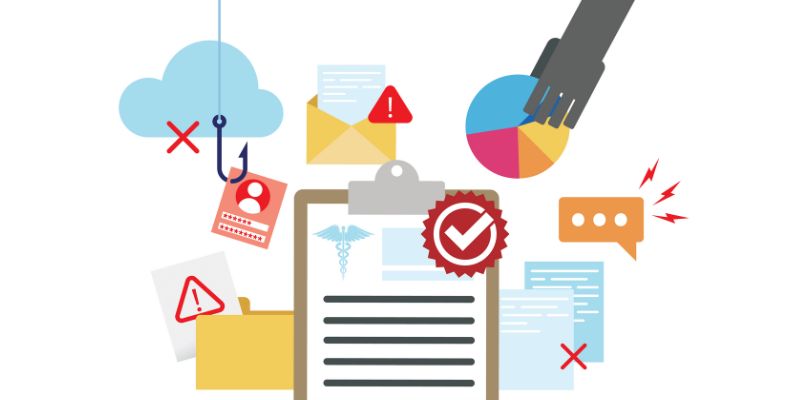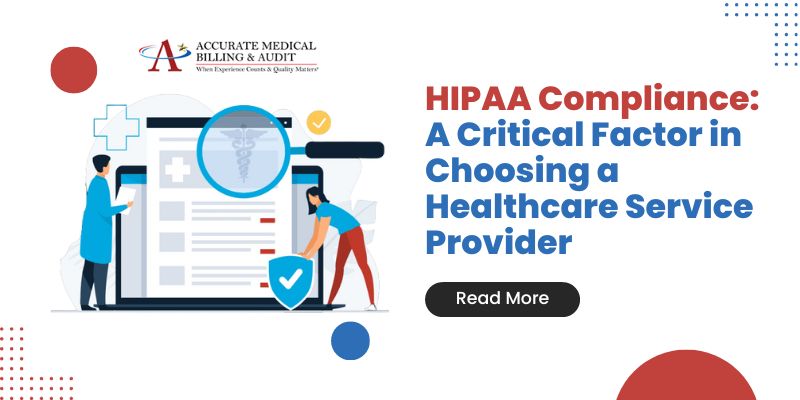Adhering to the Health Insurance Portability and Accountability Act (HIPAA) is necessary for healthcare providers to protect confidential patient health data. Nevertheless, ensuring and upholding compliance has grown increasingly crucial because of evolving technologies. Therefore, you must consider a compliant healthcare service provider for your benefit.
What Is HIPAA?

HIPAA, a federal law in the United States, is mandatory for organizations managing electronic protected health information (e-PHI) to implement network, physical, and procedural security practices. PHI is health data used to identify an individual. It is often held or transmitted by a covered entity or a business associate.
E-PHIS are susceptible to fraud and data breaches. This susceptibility poses cybersecurity and financial risks to the healthcare sector. Inadequate data protection, unauthorized data access, non-compliance, and system breaches can have serious consequences, potentially leading to substantial penalties and harm to a company’s reputation.
To address these issues, HIPAA regulations undergo frequent updates, including recent enhancements to individuals’ access rights to their medical records. Additionally, organizations managing PHI must continually assess their security measures per HIPAA standards.
Components of HIPAA Compliance Services

It is essential to understand the factors involved in HIPAA compliance services. These solutions operate as comprehensive measures, addressing all aspects of HIPAA compliance, where each domain plays a crucial role in ensuring an efficient program.
1. Training and educating employees
Active engagement from employees is crucial in achieving HIPAA compliance. Providers of HIPAA compliance services deliver comprehensive training programs to educate employees about compliance.
These training initiatives cover a wide array of subjects. These often include acquiring the skills to respond appropriately to potential data breaches, identifying potential risks to patient data, and defining PHI and its protection.
2. Assessing and analyzing risk
Providers of HIPAA compliance services carefully examine current practices, protocols, and policies to pinpoint potential instances of susceptibility or non-compliance.
The process offers a thorough understanding of the organization’s adherence to HIPAA regulations. It also focuses on areas in need of immediate correction or gradual enhancement. It forms the foundation for developing and implementing compliance strategies.
3. Ongoing monitoring and maintenance
Ensuring compliance must be a continuous effort. HIPAA compliance services guarantee continuous monitoring of an organization’s adherence. It also helps in conducting routine audits to maintain current policies.
HIPAA compliance solutions involve tracking HIPAA revisions and adjusting policies to accommodate these changes. Ongoing maintenance also involves actively monitoring cybersecurity threats that may put patient data at risk.
4. Evaluation and implementation of policy and procedure
Existing policies and procedures undergo an assessment to meet HIPAA’s regulatory and legal requirements. Compliance helps provide support and direction in reforming and strengthening these instruments to improve compliance with HIPAA standards.
Additionally, well-defined and effective policies to ensure that this is followed may involve the protection of electronic health records, emergency operational protocols, and other critical aspects.
5. Managing and supporting incidents
The HIPAA compliance service immediately implements an incident management protocol to address breaches. This protocol includes breach identification and categorization, investigative procedures, notifying affected parties, and reporting to regulatory authorities.
It also involves implementing measures to prevent future incidents. This comprehensive support guarantees that the organization swiftly recovers from an incident while minimizing potential damages and risks.
Advantages of HIPAA Compliance Services
Healthcare organizations that adopt HIPAA compliance and partner with service providers are sure to enjoy many benefits that may include:
Patient data protection
HIPAA imposes strict measures to protect patient information. This guarantees the confidentiality and security of sensitive data. It also shows a commitment to protecting patient privacy and promoting a sense of trust among patients.
By adhering to various levels of protection, healthcare providers can meet their legal obligations and ensure they meet their ethical duty to preserve the privacy and security of the individuals they serve.
Legal compliances
HIPAA compliance is a mandatory legal obligation. Neglecting to adhere to the regulations can lead to penalties. Healthcare providers who follow HIPAA guidelines can protect themselves from the financial repercussions that non-compliance can cause.
Therefore, ensuring strict adherence is a prudent and responsible approach that protects both patient data privacy and the financial well-being of the provider.
Improved data protection
HIPAA promotes the adoption of comprehensive data management protocols. These enhancements in data management ensure regulatory compliance and apparent benefits for patient care.
By simplifying access to crucial medical information, healthcare providers can make more informed decisions. Therefore, HIPAA’s emphasis on robust data management practices becomes a critical factor that helps to promote the overall quality and efficiency of healthcare services.
Enhanced reputation
Compliance with HIPAA clearly indicates a healthcare provider’s commitment to protecting patient safety and upholding high levels of data security. This dedication can improve the provider’s reputation among other healthcare professionals.
Healthcare organizations can build a positive reputation that appeals to patients and potential partners by prioritizing patient privacy and data protection. Due to their improved reputation, they may become a popular option for people looking for healthcare and industry partnerships.
Reduced risk of data breaches
The comprehensive measures outlined in HIPAA compliance are crucial in reducing the possibility of data breaches and cyberattacks. Achieving this lowers the risk of expensive and devastating incidents affecting financial stability and reputation.
By putting these security measures in place, healthcare providers strengthen their defenses against attacks on private patient information. They also show their dedication to data security and privacy.
Conclusion
HIPAA compliance should be a non-negotiable factor when selecting a healthcare service provider. It ensures the protection of patient data, legal adherence, and the preservation of reputation. Prioritizing HIPAA compliance is essential for quality healthcare delivery and maintaining trust within the healthcare system.






I’ve been surfing on-line more than 3 hours these days, yet I never discovered any interesting article like yours. It…